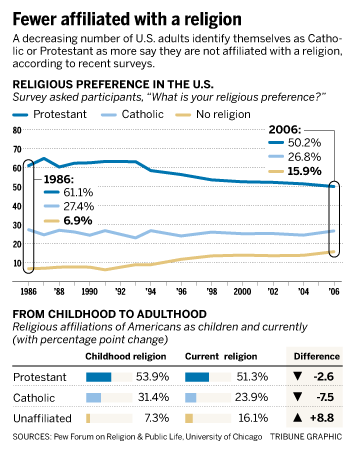 |
Chicago: Many Roman Catholics and Protestants in America are leaving the churches of their childhood and either embracing other faiths or claiming no religion at all, according to an extensive national survey released Monday.
The findings from the Pew Forum on Religion & Public Life illustrate the fluid dynamics of American religion. More than a quarter of adults, or 28 percent, said they had left the faith in which they were raised. If changes among types of Protestantism are included, 44 percent have switched affiliation.
Sixteen percent of adults said they are not members of any religious group, making that “unaffiliated” segment the fourth-largest religious tradition in the U.S., comparable in numbers to the mainline Protestant churches. The three largest religious groups, the study found, are Protestant evangelicals at 26 percent, Catholics at 24 percent and historic mainline Protestants at 18 percent.
“One can certainly make the case that America will be a less Protestant and a less Christian nation a century from now. But how much less Protestant and how much less Christian — that’s a little bit hard to gauge because of the dynamism,” said John Green, a report author and a senior fellow at the Pew Forum.
The Catholic Church has lost more members than any other religious group, the survey found, making roughly 10 percent of all Americans former Catholics.
Those losses, however, have been largely offset by Catholic immigrants entering the country, most of them from Latin America, the report said. The result is that the total percentage of the population that identifies as Catholic has remained stable.
Pew Forum director Luis Lugo said the fact that Catholics are leaving for Protestant churches or reporting no religious affiliation reflects stiff competition in the nation’s religious marketplace.
“Everybody in this country is losing members; everybody is gaining members,” Lugo said. “It’s a very competitive marketplace, and if you rest on your laurels you’re going to be history.”
Researchers also found such a sharp decline in American Protestantism that “the United States is on the verge of becoming a minority Protestant country.”
The number of Americans who said they were members of Protestant denominations now stands at barely 51 percent. The Protestant population also is diverse and fragmented, encompassing hundreds of denominations. The largest groups of Protestants are evangelical churches, mainline churches and historically black churches.
Just 4 percent of Americans called themselves atheist or agnostic. The rest of the unaffiliated — 12 percent of Americans — are almost equally divided between the “secular unaffiliated,” who say religion is not important in their lives, and the “religious unaffiliated,” who say it is at least somewhat important.
Other major findings:
* The Midwest is a “microcosm of American religion” closely resembling the religious makeup of the nation. The South has the heaviest concentration of evangelical Protestants. The Northeast has the most Catholics, and the West has the most unaffiliated people.
* Mormons and Muslims are the groups with the largest families; more than one in five Mormon adults and 15 percent of Muslim adults in the U.S. have three or more children living at home.
* Of all the major racial and ethnic groups, black Americans are the most likely to report a formal religious affiliation. Even among unaffiliated black people, three in four are in the “religious unaffiliated” category.
* Hinduism exhibits the highest overall retention rate, with 84 percent of adults who were raised as Hindus saying they were still Hindu. (Hindus, offer gratitude to Ishwar and Rishis for showing us the most perfect way to live life and evolve. HJS is developing a dedicated section on scientific and practical knowledge of Hindu Dharma on this website – Editor)
The findings came from a survey of 35,000 adults conducted last summer.
Source: Chicago Tribune




